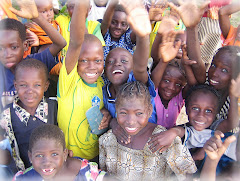Location: CEF of Burkina Faso national headquarters (three hours from Ouaga, where I live). The message: what the Bible says about children. Time allotted: 3-4 hours. The audience: 60 pastors.
Yep, I—who am not a pastor—was supposed to teach a group of 60 pastors about the Bible during a two-day conference aimed at spreading the vision of children’s ministry. It was a bit unnerving.
Good thing God was there.
At the end of my message, we gave time for questions. One of the pastors asked, “Did I really hear you right when you said you believed in Jesus and became a Christian at just four years old?” The other pastors sat forward, as if they too were wondering if I’d really intended to say that or just messed up my French.
“Yes,” I answered.
The pastor hesitated before continuing, “Can anyone be saved at that age?”
The Child Evangelism Fellowship® worker who was translating to the tribal language spoken in that region interjected, “They think that Americans are smarter than Africans. He’s asking if a Burkinabe child could really understand.”
And the good news is that they do. I’ve seen it. I don’t just mean I’ve seen children pray and tell Jesus they believe in Him; I’ve seen Him working through them.
By the end of the conference, the pastors (who turned out to be not so intimidating as I thought) were thanking us profusely and exhorting us to go tell all the churches in Burkina Faso about this.
Which is overwhelming.
Good thing God is here.
Not long after the conference, we formed a CEF® committee for Ouaga. I am no longer working alone! Already, the committee members have been using their connections to set up meetings with pastors, which has led to teacher trainings, which in turn will lead to Good News Clubs and children being reached.
And all around the world, God is making things like this happen. Last year, over 15 million children heard the Gospel through CEF ministries, and over five million of them believed in Christ for the first time.
Good thing God is here.
· The opportunity to see friends and family while I was in the U.S. for a conference and training.
· The members of the new CEF of Ouaga committee, who have already started working to expand the ministry.
Please pray for:
· The organization of teacher training courses during the school break (which begins in July).
· Churches that will partner with CEF to start Good News Clubs in their neighborhoods.
Fun Facts:
- Burkinabe schools often have 80 children in each class.
- The longer you own a moto (moped), the harder it is to start it, but fortunately, the neighbors are always ready to help out, and new spark plugs cost less than two dollars.
- When I asked the review game question “How did Jesus take the punishment for your sins?” one of the children responded, “On purpose!”



